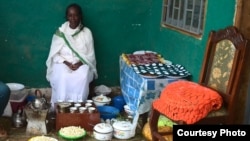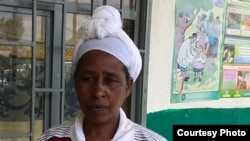DOSHA, ETHIOPIA —
Thousands of women in Ethiopia have joined a Health Development Army to turn the time-honored cultural practice of drinking coffee together into an opportunity to spread the word about better health practices in their rural communities. The army is made up of small groups of volunteers who gather in traditional coffee ceremonies to encourage behavior change among women and their neighborhoods.
Women in villages throughout Oromia, the largest and most heavily populated of Ethiopia’s rural provinces, gather and talk over several rounds of coffee served in tiny ceramic cups. The beverage is brewed with locally-grown and unprocessed coffee beans roasted and ground by a local woman dressed in traditional Ethiopian attire. The finished product is brewed over a small lemon grass fire and served to invited guests. They take their coffee with sugar, but no milk.
Gossip gives way to talk about hygeine
This long-standing social tradition and source of daily gossip – in a country that claims to be the birthplace of coffee – has become the educational platform used by the local health volunteers of the Health Development Army. They are trained by the government’s vast network of health extension workers to bring behavior change at the community level and whip up support for government health programs.
Datu Badadha, leader of a women’s group that meets for coffee in the village of Dosha, said these educational gatherings allow married women to get together with young women or men in the community for discussions.
Pathfinder International, an international non-profit, provides technical, financial and managerial support to the Ethiopian government’s health programs.
“The Women Development Army are women that have implemented the health extension program of government very well so that others in their communities can see what they are benefitting out of this health extension program so that they can adapt or adopt what this Women Development Army are doing,” said Tariku Nigatu, who works with Pathfinder International in Ethiopia.
Latrines, vaccines and maternity
“In some households, people would not be using latrines and this Women Development Army member would encourage households to dig latrines and use it," Nigatu continued. "They encourage women to take their children to vaccination. When there are pregnant women they also refer them to seek maternity care from health extension workers and from health centers.”
Tariku added that members of the army are able to interact freely with people in the community because they have a defined physical structure – a mud house with a living room, bedroom and store with separate accommodations for the kitchen, latrine and livestock. A house that fulfills the new requirements is called a model household and its inhabitants can supervise the implementation of health programs in five other homes.
Mesfin Nigussie of the U.S. Agency for International Development’s Integrated Family Health Program said, “To be a model household they need to have a latrine, they have to use family planning and their children under one year should be fully immunized. They should have a separate house for living, cooking as well as for cattle. They should also have clean surroundings and eat balanced diets.”
Homes that meet these requirements are awarded certificates. Mesfin said 64 percent of of those in the Oromia region now live in model households, a marked departure from the single huts which used to serve both as sleeping quarters and kitchens.
He said the work of the Health Development Army is also helping to sustain behavior change in communities. Mesfin said the role played by members of the army in social mobilization is as well helping health extension workers to concentrate on clinical duties at the health posts.
Women in villages throughout Oromia, the largest and most heavily populated of Ethiopia’s rural provinces, gather and talk over several rounds of coffee served in tiny ceramic cups. The beverage is brewed with locally-grown and unprocessed coffee beans roasted and ground by a local woman dressed in traditional Ethiopian attire. The finished product is brewed over a small lemon grass fire and served to invited guests. They take their coffee with sugar, but no milk.
Gossip gives way to talk about hygeine
This long-standing social tradition and source of daily gossip – in a country that claims to be the birthplace of coffee – has become the educational platform used by the local health volunteers of the Health Development Army. They are trained by the government’s vast network of health extension workers to bring behavior change at the community level and whip up support for government health programs.
Datu Badadha, leader of a women’s group that meets for coffee in the village of Dosha, said these educational gatherings allow married women to get together with young women or men in the community for discussions.
Pathfinder International, an international non-profit, provides technical, financial and managerial support to the Ethiopian government’s health programs.
“The Women Development Army are women that have implemented the health extension program of government very well so that others in their communities can see what they are benefitting out of this health extension program so that they can adapt or adopt what this Women Development Army are doing,” said Tariku Nigatu, who works with Pathfinder International in Ethiopia.
Latrines, vaccines and maternity
“In some households, people would not be using latrines and this Women Development Army member would encourage households to dig latrines and use it," Nigatu continued. "They encourage women to take their children to vaccination. When there are pregnant women they also refer them to seek maternity care from health extension workers and from health centers.”
Tariku added that members of the army are able to interact freely with people in the community because they have a defined physical structure – a mud house with a living room, bedroom and store with separate accommodations for the kitchen, latrine and livestock. A house that fulfills the new requirements is called a model household and its inhabitants can supervise the implementation of health programs in five other homes.
Mesfin Nigussie of the U.S. Agency for International Development’s Integrated Family Health Program said, “To be a model household they need to have a latrine, they have to use family planning and their children under one year should be fully immunized. They should have a separate house for living, cooking as well as for cattle. They should also have clean surroundings and eat balanced diets.”
Homes that meet these requirements are awarded certificates. Mesfin said 64 percent of of those in the Oromia region now live in model households, a marked departure from the single huts which used to serve both as sleeping quarters and kitchens.
He said the work of the Health Development Army is also helping to sustain behavior change in communities. Mesfin said the role played by members of the army in social mobilization is as well helping health extension workers to concentrate on clinical duties at the health posts.






